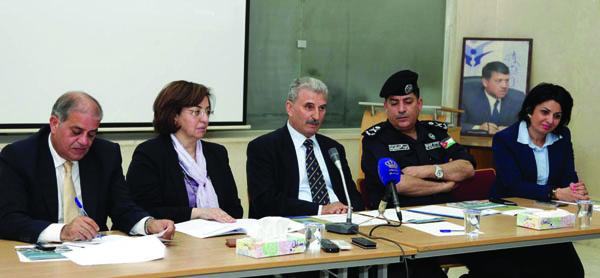You are here
Report says detention centres overcrowded, lack advanced healthcare
By Laila Azzeh - Apr 07,2015 - Last updated at Apr 07,2015

AMMAN — Limited healthcare services, overcrowded prisons and "poor" implementation of the classification system are some of the problems facing inmates in Jordan, according to the First Periodic Report on Conditions at Reform and Rehabilitation Centres.
Covering the period from January 1, 2013 to June 30, 2014, the report, released Tuesday, also showed a shortage in the number of blankets provided to inmates — with each only given one and not being allowed to bring any more from outside the correctional facility.
Moreover, inmates complained about the "poor" quality of beds and mattresses, short visit durations, lengthy periods of administrative detention and high prices at the supermarkets located at the centres, according to the report, which is based on 48 field visits carried out by 35 human rights activists, media personnel, psychologists and forensic doctors.
The visits were organised by the National Monitoring Team for the Prevention of Torture, KARAMA, which operates under the mandate of the National Centre for Human Rights (NCHR) with the support of the Dignity-Danish Institute Against Torture.
The report said some inmates claimed they were tortured or ill-treated by Criminal Investigation Department and the Anti-Narcotic Department personnel, a charge KARAMA group was unable to verify.
In addition, "many" inmates claimed being abused by the administrators of solitary confinement.
"According to the observations of the group, torture was not a common policy, occurrence or practice at the rehabilitation centres," NCHR Chief Commissioner Mousa Burayzat said at a press conference to announce the outcomes of the report.
The study also showed that women inmates still lack access to gynaecologists and that the correctional centres need permanent resident physicians, while "not every centre has a mental health clinic to promote inmates' psychological health."
With the study noting that some detention centres are overcrowded with 12,766 administrative detainees during the period in question, a number of inmates complained of the lack of legal representation provided to them during trial if they were unable to afford a lawyer.
On the other hand, the report said "numerous" foreign detainees, mainly of Asian nationalities, are awaiting deportation, while some 6,224 foreign detainees were deported in 2013.
On the bright side,
KARAMA group recorded a number of positive developments, such as the increase in awareness campaigns carried out by the Public Security Department (PSD) in prisons and the implementation of 21 literacy courses that benefited 447 inmates.
Moreover, PSD installed boxes for suggestions and complaints at the centres and tasked prosecutors general with following up on inmates' complaints at the facilities.
A number of outdoor spaces were also inaugurated and special regulations were enforced to enhance visit experiences of inmates' families and friends.
"The advancement of countries is measured today by the humanitarian conditions of their prisons," Burayzat said, adding that the report recommends closing down Jweideh Correctional and Rehabilitation Centre due to its overall "bad" conditions.
For his part, Basel Tarawneh, the government's human rights coordinator, said a ministerial team will study the report to expand on the achievements and address shortcomings.
"A memo calling for immediate intervention and response to the report will be referred to the prime minister," he added.
PSD Deputy Director Brig. Gen. Musa Abu Jumaa underlined the department's "seriousness" in following up on the recommendations, urging judges and prosecutors general to carry out periodic field visits to detention centres to become acquainted with the situation of inmates.
Related Articles
AMMAN — A recent workshop to commemorate Nelson Mandela International Day, annually marked on July 18, has called to reduce the number of in
AMMAN — Activists and government entities involved in the third phase of Karama project that addresses torture and abuse claims vowed on Sun
AMMAN — The National Centre for Human Rights (NCHR) on Monday said that it had received over 100 claims of torture and cruel treatment at th











